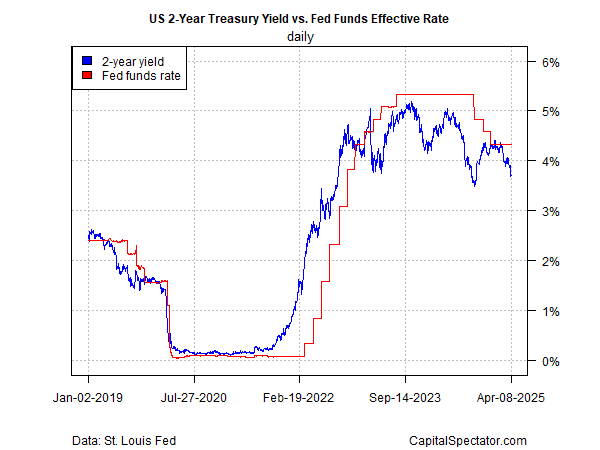Raytheon awarded $71 million in Navy contracts for missile systems
Is inflation or slower growth, and perhaps recession, the priority? This basic question hangs over the Federal Reserve as it grapples with deciding how to respond to global trade war.
The risks shot higher after the US imposed higher tariffs on its major trading partners today, led by 104% import taxes on Chinese goods. Countries around the world are retaliating with their own tariffs while sending envoys to Washington in the hope of negotiating better terms. Where all this leads is anyone’s guess, but for now, at least, it surely puts the Fed in an unusually uncomfortable spot of trying to set policy for a rapidly changing macro environment.
Using the policy-sensitive US Treasury 2 Year (NASDAQ:UTWO) yield as a guide suggests the pressure for a rate cut is building. The 2-year yield fell to 3.74% on Tuesday (Apr. 8), close to the lowest level since September. As a result, the 2-year yield has fallen well below the current median effective Fed funds target rate of 4.33%, which suggests that the market is betting on rate cuts.

Fed funds futures are increasingly pricing in a higher chance for a rate cut at the next FOMC meeting on May 7. The current implied probability that the central bank will ease rates is 53%, based on CME data.
The assumption is that a global trade war will curtail economic activity. But there’s also concern that sharply higher tariffs will raise inflation. The key problem for the Fed is that it’s difficult if not impossible to address both challenges simultaneously. Monetary policy, in short, is not designed to work well in a stagflation scenario.
That leaves the Fed with the task of choosing whether to prioritize inflation taming or supporting growth.
“They are in a no-win situation,” said Laurence Meyer, a former Fed governor, in a Wall Street Journal story today. Another source for the article explains:
“This administration has generated the worst shock possible for the Fed, and there’s nothing that they can do right now,” observed Riccardo Trezzi, a former Fed economist who runs Geneva-based Underlying Inflation, a consulting firm.
“Maybe they will get lucky, and they choose one of the two sides of the mandate, and ex post it will turn out they did the right thing.”
